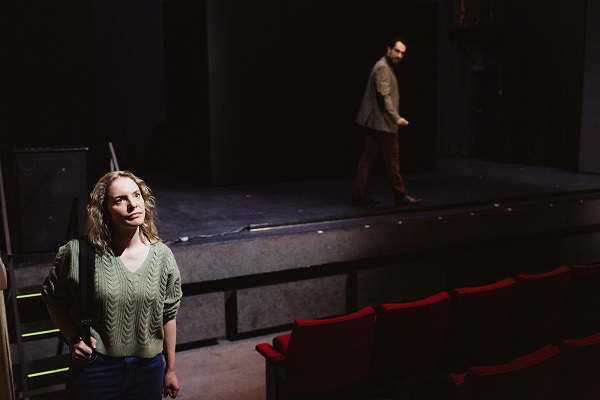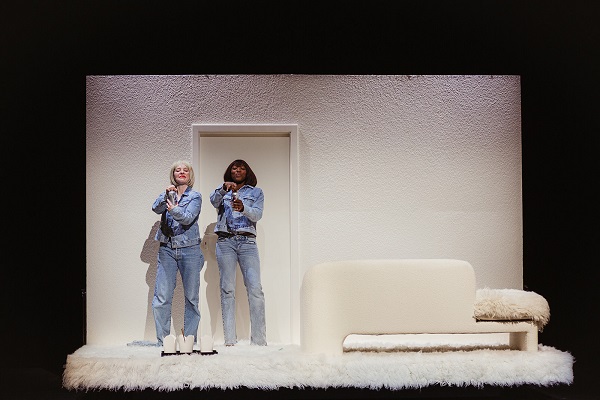 (L-R) Actress Jenny Beacraft as Actress/Writer; Daron Yates as Actor/Boyfriend;
Credit: Jeannine Unsen
(L-R) Actress Jenny Beacraft as Actress/Writer; Daron Yates as Actor/Boyfriend;
Credit: Jeannine Unsen
Chronicle.lu had the opportunity to attend the play The Writer at the Théâtre des Capucins on Tuesday evening.
Janine Goedert introduced the play, giving highlights about Ella Hickson’s work and her creative process. Hickson’s work premiered at the Almeida Theatre in London in 2018 and she has gained acclaim over the years with feminist plays she calls “instinctive”.
This play is marked by a craving for freedom and breaking out of old moulds. Ella Hickson described it as “No rules, no shoulds, no history”. The experimental form made up of five interconnected acts surprises and thrills from the beginning. The play started without the lights turning off, confusing some spectators and breaking boundaries between what is “done” at the theatre. It is an exploration of theatre as an establishment, an attack on how things are run at the theatre. Ultimately, the play explores the stifling effect of capitalism on creativity as well as the very foundation of theatre as conflict-driven.
The first tableau is a playful, rather simple conflict scene between a middle-aged theatre director and a 24-year-old English literature student. When he offers her the possibility to put on a play (mainly because of how energetically angry she is), she refuses and deplores his inability to understand her. An idealist at heart, she wants her art to be “true” first and foremost and she resents him for his money-oriented approach to theatre. This first conflict-driven scene and the refusal of a big opportunity presenting itself is a red thread throughout the play, where the other characters (a writer and her boyfriend, a playwright, the theatre’s director and the actors, the writer and her girlfriend) keep referring back to the initial story one way or another. In fact, it turns out, the director had met this student and believed in her, but later forgot her after he tried to seduce her, despite their large age difference.
The second scene, with its Q&A, broke the barriers between the audience seats and the actors, and it exposed (in an uncomfortable, tongue-in-cheek way) the buzz word “intersectionality”. How power, gender and race connect in very real ways and can expose tokenism at second glance. The disgruntled male lead kept uttering “It is complex” upon being asked simple questions such as why there is a person of colour on the poster when the lead actress is white. The poster was indeed an intriguing element, due to featuring a person of colour that seemingly had no connection to the play.
Perhaps most importantly, the play delves into questions of gender and what it means to write theatre as a woman, to write and live as a woman. It asks whether it is possible to be a woman on stage and be perceived as a subject, whether creativity and freedom are possible when the men in power (and the money in charge) do not understand what you are trying to do.
The play elegantly blends different moods, settings and experimental choices, showing the workings of what is happening backstage, but also teasing the audience with the question of what happens when the author is forced to make a certain choice – to create an ending – or to give someone what they want. Whether it be a romantic partner (male or female), the audience or the director.
The Writer revels in the possibility of disorder and strangeness as a good-enough way to tell a story and lay bare the inner mechanism of our current society. Where it breaks an expectation, it points at it and shows that this is possible, too, even if some may not want to take it seriously.
Additional performances of The Writer are taking place at the Théâtre des Capucins in Luxembourg-Ville on Wednesday 22, Friday 24, Tuesday 28, Thursday 30 and Friday 31 March and on Saturday 1 April 2023 at 20:00. Further information: https://theatres.lu/fr/thewriter.









